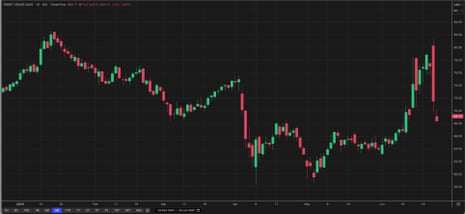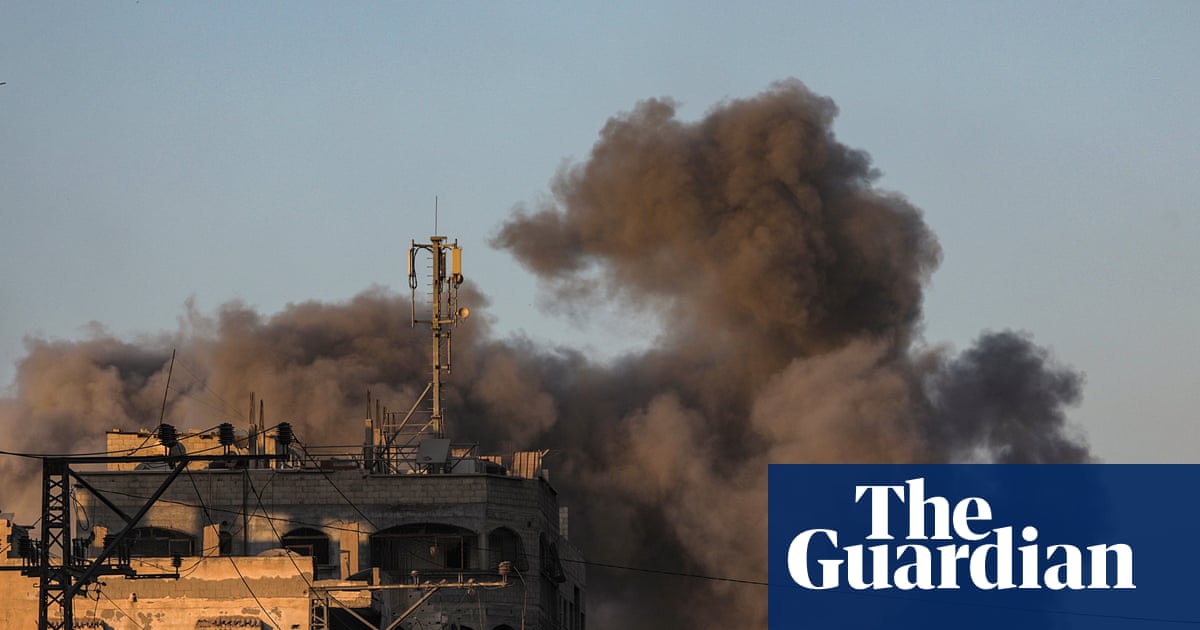Introduction: Oil falls back as geopolitical fears ease
Good morning, and welcome to our rolling coverage of business, the financial markets and the world economy.
The geopolitical fears that have gripped the markets for almost two weeks are fading, after President Trump declared that Israel and Iran have negotiated a ceasefire.
The oil price has slumped back to its levels before the Israel-Iran conflict began, easing fears of a stagflationary slump hurting the world economy.
Brent crude tumbled on Monday, as hopes rose for a lasting pause in the Middle East clashes. It’s dropped by another 3.1% this morning to $69.25 per barrel.

That’s Brent’s lowest level since 11 June, the day before Israel launched a series of strikes against Iran’s nuclear and military sites.
Monday’s selloff was a surprise – oil slumped after Iran launched a retaliatory missile strike on a US airbase which was well-telegraphed in advance, and unsuccessful.
That eased fears that Tehran might attempt to close the strait of Hormuz, disrupting the flow of a third of the world’s oil.
The oil selloff continued on Tuesday morning, after Donald Trump declared that a ceasefire between Israel and Iran was in force.
Just after 6am UK time, he posted:
“THE CEASEFIRE IS NOW IN EFFECT. PLEASE DO NOT VIOLATE IT! DONALD J. TRUMP, PRESIDENT OF THE UNITED STATES!”
Markets across the Asia-Pacific region have rallied, while the US dollar is dipping as investors move out of safe-haven currencies (details to follow..).
The agenda
-
8am BST: UK grocery inflation report from Kantar
-
11am BST: CBI industrial trends report on UK factory sector
-
2.30pm BST: Treasury committee hearing into fair pricing
-
3pm BST: Bank of England governor Andrew Bailey testifies to the Lords Economic Affairs Committee
-
3pm BST: Federal Reserve chair Jerome Powell testifies to Congress 3pm
Key events Show key events only Please turn on JavaScript to use this feature
Despite all the fears over the weekend, over the last 12 hours we’ve seen a pretty remarkable de-escalation of tensions in the Middle East, reports Deutsche Bank’s market strategist Jim Reid.
The best scorecard of this has been the price of oil which now trades just below $70/bbl, having opened at just over $80/bbl early yesterday morning in Asia.
Brent crude (-7.18%) posted its biggest daily decline since 2022 and is subsequently trading another -2.56% lower this morning at $69.65/bbl, close to the levels before Israel’s strikes against Iran on June 13. Easing geopolitical concerns helped the S&P 500 rebound +0.96%, with futures another +0.55% higher overnight.
Dollar down
The US dollar has weakened against a basket of currencies this morning.
This has pushed the pound up by half a cent, to $1.3575, and the euro by a third of a cent to $1.161.
The US dollar’s status as a safe-haven currency has been questioned recently, due to fears over America’s debt pile and trade war fears. These moves, though, suggest it has benefitted from safe-haven inflows, which are now unwinding.
Asia-Pacific markets rally
Stock markets across the Asia-Pacific region have been swept higher by hopes of a lasting ceasefire in the Middle East.
China’s main markets are up between 1.1% and 1.6%, with Hong Kong’s Hang Seng gaining 1.8%.
In South Korea, the KOSPI index has jumped over 3%, while Japan’s Nikkei 225 is up 1.3%.
The '“tentative ceasefire” between Iran and Israel is supporting a relief rally, reports Kyle Rodda, senior financial market analyst at capital.com, who explains:
The moves in the markets have been considerable, especially as market participants priced-out the war premium that had been slowly discounted over the course of the past fortnight and had briefly increased at the Asian open yesterday.
Oil prices are down almost 9% on that fact alone, taking pressure off yields and helping stock valuations rebound, with Wall Street surging, led by longer-duration stocks in the tech space. Ultimately, the drop in implied volatility also boosted stocks prices, as investors looked beyond the conflict between Iran and Israel.
There is always the risk of complacency and that these moves are premature. But, once again, as long as the aforementioned parameters remain unmet, the moves are likely to stick.
Introduction: Oil falls back as geopolitical fears ease
Good morning, and welcome to our rolling coverage of business, the financial markets and the world economy.
The geopolitical fears that have gripped the markets for almost two weeks are fading, after President Trump declared that Israel and Iran have negotiated a ceasefire.
The oil price has slumped back to its levels before the Israel-Iran conflict began, easing fears of a stagflationary slump hurting the world economy.
Brent crude tumbled on Monday, as hopes rose for a lasting pause in the Middle East clashes. It’s dropped by another 3.1% this morning to $69.25 per barrel.

That’s Brent’s lowest level since 11 June, the day before Israel launched a series of strikes against Iran’s nuclear and military sites.
Monday’s selloff was a surprise – oil slumped after Iran launched a retaliatory missile strike on a US airbase which was well-telegraphed in advance, and unsuccessful.
That eased fears that Tehran might attempt to close the strait of Hormuz, disrupting the flow of a third of the world’s oil.
The oil selloff continued on Tuesday morning, after Donald Trump declared that a ceasefire between Israel and Iran was in force.
Just after 6am UK time, he posted:
“THE CEASEFIRE IS NOW IN EFFECT. PLEASE DO NOT VIOLATE IT! DONALD J. TRUMP, PRESIDENT OF THE UNITED STATES!”
Markets across the Asia-Pacific region have rallied, while the US dollar is dipping as investors move out of safe-haven currencies (details to follow..).
The agenda
-
8am BST: UK grocery inflation report from Kantar
-
11am BST: CBI industrial trends report on UK factory sector
-
2.30pm BST: Treasury committee hearing into fair pricing
-
3pm BST: Bank of England governor Andrew Bailey testifies to the Lords Economic Affairs Committee
-
3pm BST: Federal Reserve chair Jerome Powell testifies to Congress 3pm

 2 months ago
54
2 months ago
54

















































